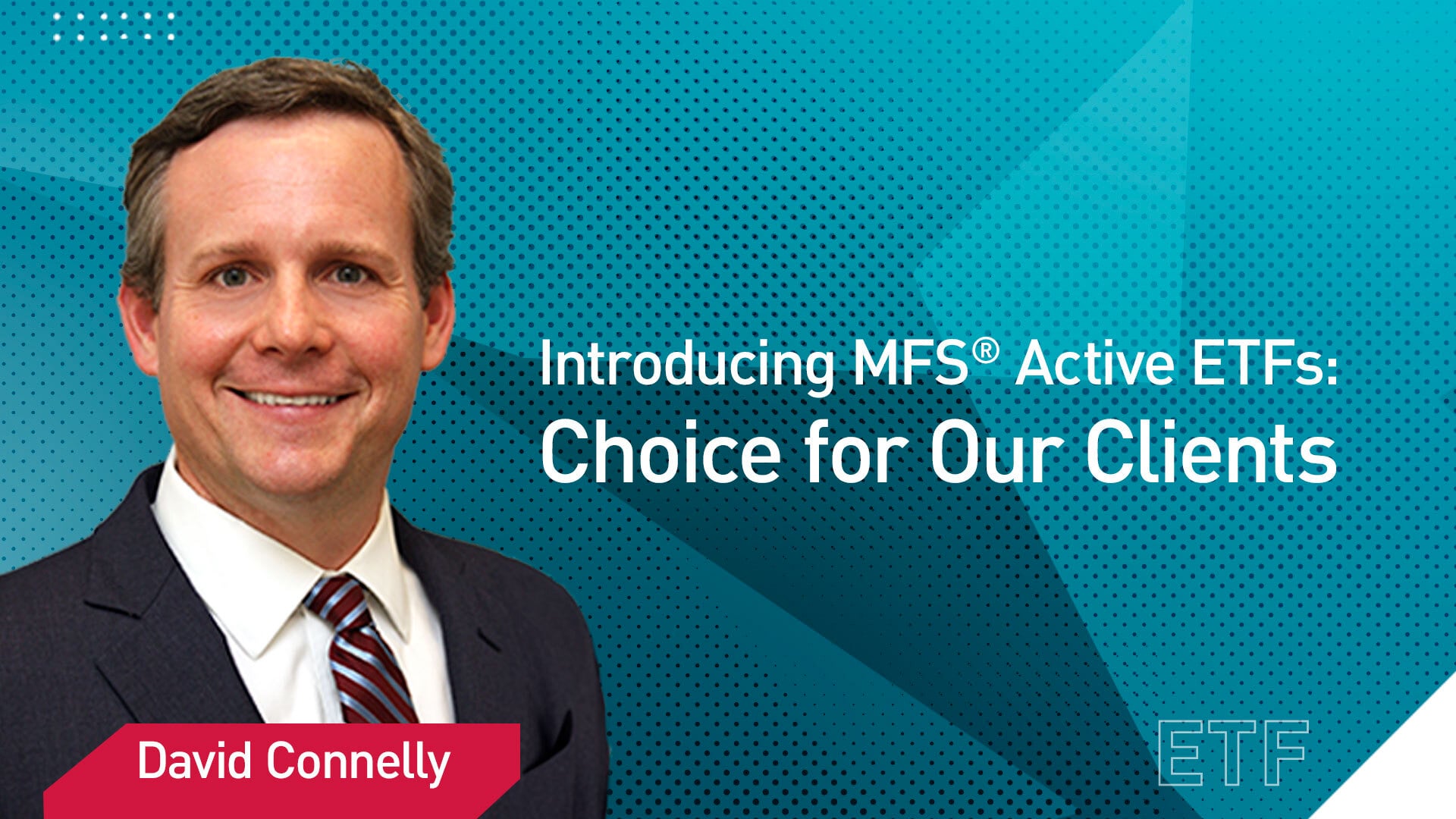Introducing MFS Active ETFs: Choice for Our Clients
Dave Connelly, Head of Global Product, announces the launch of five MFS® Active ETFs, an exciting step in our 100-year journey to deliver long-term value to our clients.
Introducing MFS® Active ETFs: Choice for Our Clients
MFS® Active ETFs: Designed for a range of objectives and needs
Since the creation of the mutual fund over a hundred years ago, MFS has continually evolved how we deliver long-term value to our clients – Exchange Traded Funds are an exciting next step on that journey.
MFS offers actively managed, daily transparent ETFs.
We believe efficient delivery of our investment capabilities through this well-established structure can be beneficial to many clients.
Our initial suite of five ETFs represents a diversified mix of proven MFS capabilities.
The suite includes 3 equity offerings providing focused exposure to US large cap value, US large cap growth, and non-US equity respectively. On the fixed income side – we have taxable core plus strategy and a national municipal strategy. These five offerings can serve as primary building blocks in a well-diversified portfolio.
Exchange Traded Funds extend the vehicle choice MFS provides our clients. We view ETFs as an important addition and complement to our overall vehicle line up.
Thank you for your continued confidence in MFS. As always, we remain committed to delivering long-term value and aligning with the evolving needs of our clients.
Important risk considerations: The funds may not achieve its objective and/or you could lose money on your investment in the fund. Exchange-Traded Funds (ETFs): trade like stocks, are subject to investment risk, and will fluctuate in market value. Shares of ETFs are bought and sold at market price, not NAV, and are not individually redeemed from the fund. The market price at the time of sale may be higher or lower than the fund’s NAV, and any applicable brokerage commissions will reduce returns. There can be no guarantee that an active market for the funds will develop or be maintained. Stock: Stock markets and investments in individual stocks are volatile and can decline significantly in response to or investor perception of, issuer, market, economic, industry, political, regulatory, geopolitical, environmental, public health, and other conditions. Bond: Investments in debt instruments may decline in value as the result of, or perception of, declines in the credit quality of the issuer, borrower, counterparty, or other entity responsible for payment, underlying collateral, or changes in economic, political, issuer-specific, or other conditions. Certain types of debt instruments can be more sensitive to these factors and therefore more volatile. In addition, debt instruments entail interest rate risk (as interest rates rise, prices usually fall). Therefore, the portfolio's value may decline during rising rates. Portfolios that consist of debt instruments with longer durations are generally more sensitive to a rise in interest rates than those with shorter durations. At times, and particularly during periods of market turmoil, all or a large portion of segments of the market may not have an active trading market. As a result, it may be difficult to value these investments and it may not be possible to sell a particular investment or type of investment at any particular time or at an acceptable price. The price of an instrument trading at a negative interest rate responds to interest rate changes like other debt instruments; however, an instrument purchased at a negative interest rate is expected to produce a negative return if held to maturity. Derivatives: Investments in derivatives can be used to take both long and short positions, be highly volatile, involve leverage (which can magnify losses), and involve risks in addition to the risks of the underlying indicator(s) on which the derivative is based, such as counterparty and liquidity risk. High Yield: Investments in below investment grade quality debt instruments can be more volatile and have greater risk of default, or already be in default, than higher-quality debt instruments. International: Investments in foreign markets can involve greater risk and volatility than U.S. investments because of adverse market, currency, economic, industry, political, regulatory, geopolitical, or other conditions. Growth: Investments in growth companies can be more sensitive to the company's earnings and more volatile than the stock market in general. Concentrated: The portfolio's performance could be more volatile than the performance of more diversified portfolios. Value: The portfolio's investments can continue to be undervalued for long periods of time, not realize their expected value, and be more volatile than the stock market in general. Municipal Bond: Investments in municipal instruments can be volatile and significantly affected by adverse tax or court rulings, legislative or political changes, market and economic conditions, issuer, industry-specific (including the credit quality of municipal insurers), and other conditions. Because many municipal instruments are issued to finance similar projects, conditions in certain industries can significantly affect the portfolio and the overall municipal market.
Please see the prospectus for further information on these and other risk considerations
Before investing, consider the fund's investment objectives, risks, charges, and expenses. For a prospectus, or summary prospectus, containing this and other information, contact MFS or view online at mfs.com. Please read it carefully.
MFS® Fund Distributors, Inc., Member SIPC, 111 Huntington Avenue, Boston, MA 02199
59878.1
